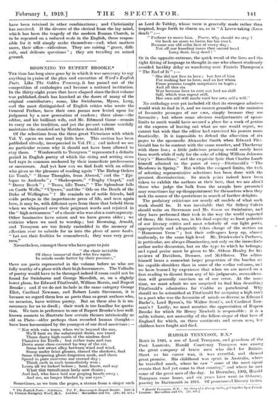HAROLD TENNYSON, R.N.*
BORN in 1800, a son of Lord Tennyson, and grandma of the Poet Laureate, Harold Courtimay Tennyson was among the great company of brave men who died for Britain. Short as his career was, it was eventful, and showed great promise. His childhood was spent in Australia, where he travelled much, where he eaw " some of the most signal events that had yet come to that cenntry," and where he met some of the great men of the day. In December, 1903, Harold Tennyson came home, and six years later went to Ostrom., passing to Dartmouth in 1911. Of pronounced literary tastes, • Harold Trnoyson, 1st •story a/a Young Center, prt &van. by a Frivid. London Ifouninou sod Co, Ps. nett
his analysis of " Character in the Navy," written when fifteen years old, is remarkably mature. In 1913 he made a special service cruise in H.M.S. `Cumberland'; thence he joined the Queen Mary' as Assistant Navigator, remaining as such until November, 1915, when he was transferred to the Viking as Navigator, which post he held until his aeath in February' 1916.
The main characteristic of his letters is his striking power of description. The account of his first voyage is lively and interesting, giving full details of his life, his happiness, his work, and his friends. None the leas readable is the account of his next cruise—his literary powers developed with his growth. A visit to Russia is fully described. Events moved rapidly after this ; the historic naval review at Spithead was followed by the outbreak of war. About the war Tennyson was exceedingly optimistic. "You were wrong in saying that you thought England was in an awful state of unpreparedness ; it could not have come at a better moment for the Fleet," he writes to his parents. From now onwards his letters are full of the various actions he took part in, though these accounts are of necessity limited. In November, 1916, after being transferred to the Viking,' he writes: "I have now got a job after my own heart and I am blissfully happy, as we are on the go from morning till night." The ' Viking' took the Cabinet to Boulogne, and Tennyson gives a most amusing account of this in one of his letters. Later, he had hopes of meetings with his parents when stationed at Dover, but these hopes were never realized, for the day after they had arrived at Dover news came that Tennyson had been killed through a mine blowing up the ' A great witness to his courage and strength of character were the letters received by his mother from officers under whom he had served, from Lady Linlithgow, Sir F. Milner, Mr. A. J. Balfour, and particu- larly Mr. Noel Ponsonby (a former master), who wrote a full appreciation of his life.
There is a curious discrepancy of fact between his last letter (p. 271) and his mother's account of his death (p. 274). The boy writes as if fatally wounded and dying, while his mother clearly states that he was killed instantaneously, his body being found beneath the debris. But that is a minor flaw in a brave record.
Very touching is the last letter to his parents, with its quotation from " The Revenge "—" 1 have only done my duty as a man is bound to do," and "I have died with a joyful spirit "—and its sense of satisfaction in "upholding the name of Tennyson."



































 Previous page
Previous page